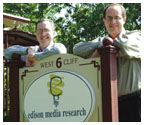|
Web Exclusives: Alumni Spotlight November 3, 2004:
Larry Rosin ’84 and Joe Lenski ’87 conduct exit polling for elections On election night TV viewers hear broadcasters spew out up-to-the-minute exit polling data indicating which candidates are winning. Much of that information is gathered about half an hour’s drive from Princeton, by Larry Rosin ’84 and Joe Lenski ’87 in the Somerville, N.J., headquarters of their marketing research company, Edison Media Research. The company was to poll and analyze issues in the presidential race, 34 senate races, 11 governors’ elections, and gay marriage referenda. Throughout Election Day, Rosin and Lenski’s exit pollers were to be stationed at voting precincts throughout the United States, stopping voters to fill out printed questionnaires, asking who they voted for and why. Periodically, the pollers would collect the questionnaires and phone the answers into headquarters, where staffers would key the information into computers. Sophisticated computer programs could sort the information, spit out data, and transmit it throughout the day to Edison’s clients, ABC, CBS, NBC, FOX, the Associated Press, and CNN, who would use the information to call the races and discuss what issues, such as Iraq, education, health care or the economy, were most important to voters. On election nights, Edison Media Research’s headquarters buzzes. Phones are ringing, five TVs are tuned into its clients’ stations, and Lenski and Rosin and their staff monitor data coming in and going out, troubleshooting glitches — an exit poller might have gotten a flat tire on the way to work, for example. Rosin, a Woodrow Wilson School major dubbed an “infomaniac” by his Princeton roommate, and Lenski, a mechanical engineering major who says he gets a thrill out of numbers, be they batting averages or voting statistics, met in 1993 while working for a market-research company in Philadelphia. They teamed up a year later to found Edison Media Research to conduct market research for radio stations, and this remains a large portion of their business. By interviewing listeners or potential listeners, the company determines what music or talk programs they prefer. Whether they are finding out what jazz FM listeners enjoy or how
voters feel about the Bush administration, Rosin and Lenski have
made a business out of learning what people want. Says Rosin, “People
like to be asked what they think.” By K.F.G.
|
||

